
Francis Bacon, 1st Viscount St Alban PC, also known as Lord Verulam, was an English philosopher and statesman who served as Attorney General and Lord Chancellor of England under King James I. Bacon led the advancement of both natural philosophy and the scientific method and his works remained influential even in the late stages of the Scientific Revolution.

Kathy Acker was an American experimental novelist, playwright, essayist, and postmodernist writer, known for her idiosyncratic and transgressive writing that dealt with themes such as childhood trauma, sexuality and rebellion. She was influenced by the Black Mountain School poets, William S. Burroughs, David Antin, Carolee Schneeman, Eleanor Antin, French critical theory, mysticism, and pornography, as well as classic literature.

Roger Bacon, also known by the scholastic accolade Doctor Mirabilis, was a medieval English philosopher and Franciscan friar who placed considerable emphasis on the study of nature through empiricism. In the early modern era, he was regarded as a wizard and particularly famed for the story of his mechanical or necromantic brazen head. He is sometimes credited as one of the earliest European advocates of the modern scientific method, along with his teacher Robert Grosseteste. Bacon applied the empirical method of Ibn al-Haytham (Alhazen) to observations in texts attributed to Aristotle. Bacon discovered the importance of empirical testing when the results he obtained were different from those that would have been predicted by Aristotle.

Luchino Visconti di Modrone, Count of Lonate Pozzolo was an Italian filmmaker, theatre and opera director, and screenwriter. He was one of the fathers of cinematic neorealism, but later moved towards luxurious, sweeping epics dealing with themes of beauty, decadence, death, and European history, especially the decay of the nobility and the bourgeoisie. Critic Jonathan Jones wrote that “no one did as much to shape Italian cinema as Luchino Visconti.”

Robert Devereux, 2nd Earl of Essex, KG, PC was an English nobleman and a favourite of Queen Elizabeth I. Politically ambitious, and a committed general, he was placed under house arrest following a poor campaign in Ireland during the Nine Years' War in 1599. In 1601, he led an abortive coup d'état against the government of Elizabeth I and was executed for treason.
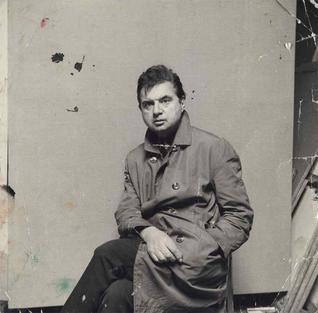
Francis Bacon was an Irish-born British figurative painter known for his raw, unsettling imagery. Focusing on the human form, his subjects included crucifixions, portraits of popes, self-portraits, and portraits of close friends, with abstracted figures sometimes isolated in geometrical structures. Rejecting various classifications of his work, Bacon said he strove to render "the brutality of fact." He built up a reputation as one of the giants of contemporary art with his unique style.
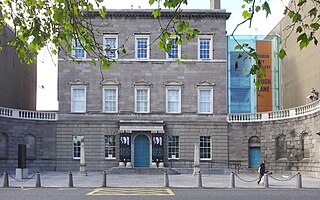
The Hugh Lane Gallery, officially Dublin City Gallery The Hugh Lane and originally the Municipal Gallery of Modern Art, is an art museum operated by Dublin City Council and its subsidiary, the Hugh Lane Gallery Trust. It is in Charlemont House on Parnell Square, Dublin, Ireland. Admission is free.

Lisa Anne Jardine was a British historian of the early modern period.
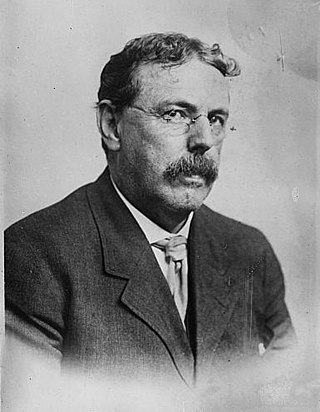
Dr. Orville Ward Owen was an American physician, and exponent of the Baconian theory of Shakespearean authorship. Owen claimed to have discovered hidden messages contained in the works of Shakespeare/Bacon. He deciphered these using a device he invented called a "cipher wheel". The alleged discoveries were published in Owen's multi-volume work Sir Francis Bacon's Cipher Story (1893–95).
Douglas A. Martin is an American poet, a novelist and a short story writer.

Anne, Lady Bacon was an English lady and scholar. She made a lasting contribution to English religious literature with her translation from Latin of John Jewel's Apologie of the Anglican Church (1564). She was the mother of Francis Bacon.
Michael Henry Peppiatt is an English art historian, curator and writer.
James Francis Lydon was an Irish educator and historian. He served as the Lecky Professor of History at Trinity College, Dublin, from 1980 to 1993, and authored numerous works, particularly on the medieval history of Ireland.

Mitte is a central section of Berlin, Germany, in the eponymous borough of Mitte. Until 2001, it was itself an autonomous district.
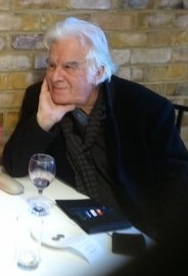
Reginald Gray was an Irish portrait artist. He studied at The National College of Art (1953) and then moved to London, becoming part of the School of London led by Francis Bacon, Lucian Freud and Frank Auerbach. In 1960, he painted a portrait of Bacon which is in the collection of the National Portrait Gallery in London. He subsequently painted portraits from life of writers, musicians and artists such as Samuel Beckett, Harold Pinter, Brendan Behan, Garech Browne, Derry O'Sullivan, Alfred Schnittke, Ted Hughes, Rupert Everett and Yves Saint Laurent. In 1993 Gray had a retrospective exhibition at UNESCO Paris and in 2006, his portrait "The White Blouse" won the Sandro Botticelli Prize in Florence, Italy.
The Francis Bacon Opera is a comic chamber opera in one act composed by Stephen Crowe. The libretto is based on Crowe's transcript of Melvyn Bragg's interview with the British artist Francis Bacon, filmed for The South Bank Show in 1985. The opera was first performed in its final version on 8 August 2012 in London, and went on to win the Hilton Edwards Award in May 2013.
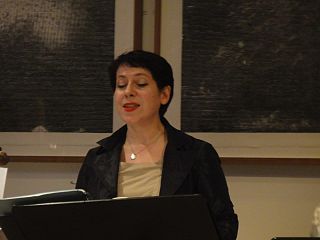
Loré Lixenberg is a British mezzo-soprano, active in contemporary and experimental music.
Perry Ogden is a British fashion and documentary photographer, and film director, based in Dublin. He is interested in Traveller culture.
Barbara Dawson is an Irish author, editor, art historian, gallery director, and curator. She is curator of several art exhibitions including the works of notable artists such as Francis Bacon (2009).













